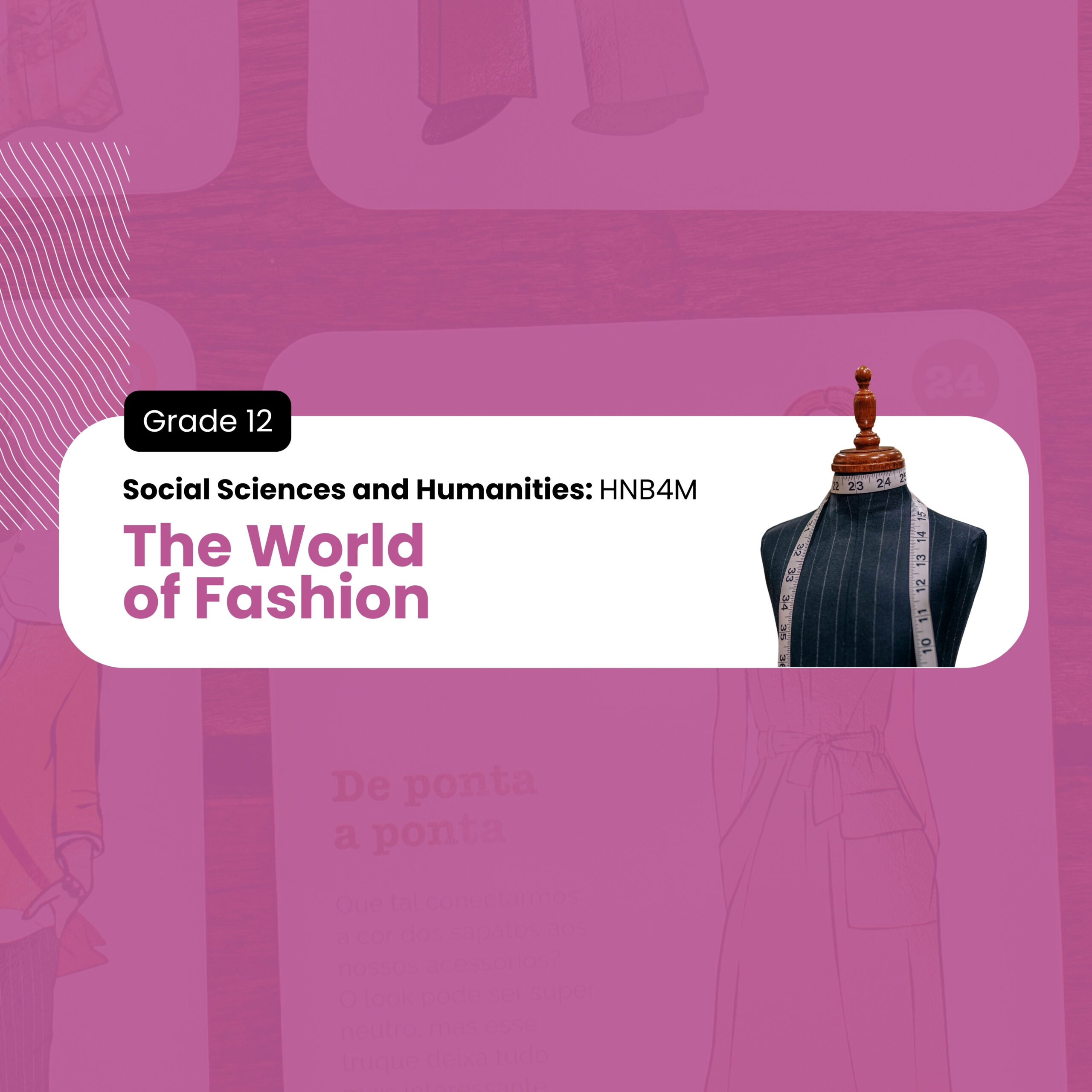
This course gives students the opportunity to explore the world of fashion. Students will learn how to create a fashion product using various tools, techniques, and technologies while developing their practical skills. Students will learn about various factors that affect the global fashion industry, the needs of specialized markets, and the impact of fibre and fabric production and care. In addition, they will learn about social and historical influences on fashion. Students will apply research skills when investigating aspects of the fashion world.
No expectations defined yet.
| Time Allocated | Online/Offline Component | |
|---|---|---|
| 1. Historical Influences on Fashion | ||
Students will be able to understand how historical developments and social issues have impacted the fashion industry. Students will analyze what are the significant historical fashion innovations that have impacted current western fashions. Students will learn in what ways technology has influenced the fashion industry. | 20 hours | Online |
| 2. Design & Fashion Construction Skills | ||
Students will learn how the elements and principles of design can be applied when creating fashion products. Students will understand what are safe operating procedures when using a sewing machine, other tools and technologies in clothing construction. Students will recognize proper construction techniques leading to successful fashion products. | 27 hours | Online |
| 3. Canadian and World Fashions | ||
Students will learn in what ways Canadian and international designers have contributed to the global fashion industry. Students will understand what is the influence of traditional and emerging fashion centres on the fashion industry. Students will analyze how branding and haute couture does influence the fashion industry. Students will recognize what are the fashion innovations and fabrics that are used in specialized fashion/clothing markets. | 27 hours | Online |
| 4. Globalization in the Fashion Industry | ||
Students will identify what are the major textile producers in the world and why. Students will learn how are textiles made and in what ways the fashion industry is reducing the environmental impact of textile production and disposal. Students will understand how globalization impacts workers around the world. Students will analyze what are the strategies used by consumers to be socially responsible with fashion choices. | 23 hours | Online |
| 5. FINAL EVALUATION | ||
The Final Evaluation for this course is a Final Project that compiles a Design and Marketing Portfolio. The final product will be in an electronic portfolio. | 15 hours | Online |
| Total | 112 Hours | |
This course is organized into a semester format. Lessons are completed independent online, with specified due dates.
Evaluation is the process of judging the quality of student work in relation to the achievement chart categories and criteria, and assigning a percentage grade to represent that quality. Evaluation is based on gathering evidence of student achievement through:
Learning goals will be discussed at the beginning of each assignment and success criteria will be provided to students. The success criteria are used to develop the assessment tools in this course, including rubrics and checklists.
A variety of assessment and evaluation methods, strategies and tools are required as appropriate to the expectation being assessed. These include diagnostic, formative and summative within the course and within each unit. We strictly follow the Ministry of Education’s Growing Success document.
Assessment FOR Learning and Assessment AS Learning is obtained through a variety of means, including the following:
Evidence of student achievement (assessment OF learning) is collected through ongoing observations of most consistent work, with consideration given to most recent work from various sources.
Assessment and evaluation in this course will be based on the provincial curriculum expectations. Students will be provided with numerous and varied opportunities to demonstrate the full extent of their achievement. Categories of assessment and breakdowns are as follows:
A final grade will be determined as follows:
● Final Evaluation 30%
Students with special needs and English Language Learners will be provided with accommodation, including additional time, assistive technology and scribe where available.
Learning Skills listed below are key to student success. Learning Skills are assessed independently of achievement and are determined through observation and participation. A check list and student conference will be used to determine the level in each category.
Students will need the following:
$549.00

¿Necesitas ayuda?